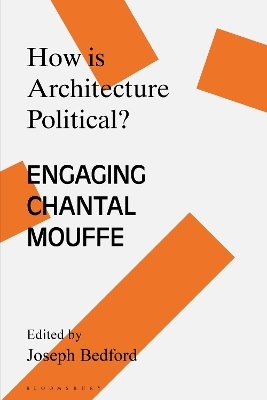
How is Architecture Political?
Bloomsbury Academic (Verlag)
978-1-350-26306-2 (ISBN)
This book brings Chantal Mouffe’s agonistic model of politics into direct dialogue with architecture and inquiries into the role that architecture plays constructing the political order of society, either by concealing or revealing its antagonisms and ideological conflicts. In doing so, it asks in what ways architecture operates politically; whether institutionally, in terms of its spaces and its part in forming cities, or as an aesthetic object with mediatic agency. Through this detailed exchange between Mouffe and four of the world’s leading architectural thinkers; Reinhold Martin, Ines Weizman, Pier Vittorio Aureli and Sarah Whiting, a debate unfolds within the book that tests the implications of Mouffe’s agonistic model of politics for architectural practice today. Through this, Bedford explores how architectural history, architectural drawing, the making of spectacular monuments, the design and policies behind housing, and the making of public and private space, all potentially contribute to the formulation of the channeling of social conflict into an agonistic form.
Joseph Bedford is Associate Professor of History and Theory at Virginia Tech, USA. He holds a PhD from Princeton University, degrees from Cambridge University and the Cooper Union, and is the founding editor of Attention: The Audio Journal for Architecture and The Architecture Exchange, a platform for theoretical exchange in architecture.
Acknowledgements
1. Introduction: How is Architecture Political?, Joseph Bedford (Virginia Tech, USA)
2. Can Architecture be Political?, Pier Vittorio Aureli (École Polytechnique Fédérale de Lausanne, Switzerland)
3. Polis - Oikos, Reinhold Martin (Columbia University, USA)
3. Mobilizing Dissent: The Possible Architecture of the Governed, Ines Weizman (Academy of Fine Arts, Vienna, Austria)
4. Agonistic Practice, Sarah Whiting (Harvard University, USA)
5. The Politics of Architecture, Round Table
6. How to Envisage the Political Dimension of Architecture, Chantal Mouffe (University of Westminster, UK)
Afterword: Chantal Mouffe
Bibliography
Index
| Erscheinungsdatum | 19.03.2024 |
|---|---|
| Reihe/Serie | Architecture Exchange: Engagements with Contemporary Theory and Philosophy |
| Zusatzinfo | 20 bw photos |
| Verlagsort | London |
| Sprache | englisch |
| Maße | 156 x 234 mm |
| Themenwelt | Geisteswissenschaften ► Philosophie |
| Technik ► Architektur | |
| ISBN-10 | 1-350-26306-0 / 1350263060 |
| ISBN-13 | 978-1-350-26306-2 / 9781350263062 |
| Zustand | Neuware |
| Informationen gemäß Produktsicherheitsverordnung (GPSR) | |
| Haben Sie eine Frage zum Produkt? |
aus dem Bereich


